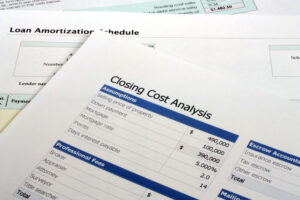Understanding Closing Costs: What Every Homebuyer Needs to Know
 Buying a home is an exciting journey, but it comes with a range of expenses beyond the down payment. One of the key components of this financial puzzle is closing costs. Understanding what these costs entail and how they affect your budget can help you prepare better and avoid surprises on closing day.
Buying a home is an exciting journey, but it comes with a range of expenses beyond the down payment. One of the key components of this financial puzzle is closing costs. Understanding what these costs entail and how they affect your budget can help you prepare better and avoid surprises on closing day.
What Are Closing Costs?
Closing costs are fees and expenses paid at the finalization of a real estate transaction. They cover various services and administrative tasks necessary to transfer ownership from the seller to the buyer. These costs typically range from 2% to 5% of the loan amount and can include:
- Origination Fees: Charged by the lender for processing the loan application. This fee compensates the lender for evaluating and preparing your mortgage loan.
- Appraisal Fees: Paid to a professional appraiser to determine the market value of the property. This ensures the lender that the property is worth the amount you’re borrowing.
- Inspection Fees: Cover the cost of home inspections to identify any potential issues or repairs needed before finalizing the sale.
- Title Search and Title Insurance: A title search verifies the property’s legal ownership and ensures there are no outstanding claims against it. Title insurance protects both the buyer and lender from any future claims on the property’s title.
- Attorney Fees: In some states, hiring a real estate attorney to review contracts and oversee the transaction is required. This fee varies depending on the complexity of the deal and local practices.
- Recording Fees: Charged by the county to officially record the new ownership of the property. This ensures the transaction is documented and recognized by local government authorities.
- Escrow Fees: Paid to an escrow company or agent who manages the funds and paperwork involved in the closing process.
- Property Taxes and Homeowner’s Insurance: Depending on the time of year, you may need to prepay property taxes and homeowner’s insurance premiums at closing.
How to Prepare for Closing Costs
- Get a Good Faith Estimate (GFE): Lenders are required to provide a Good Faith Estimate of closing costs within three days of receiving your loan application. Review this document carefully to understand the estimated costs.
- Request a Loan Estimate: This form provides a detailed breakdown of the costs associated with your mortgage, including both upfront and recurring costs. Compare it to your GFE to ensure accuracy.
- Budget Accordingly: Set aside funds for closing costs in addition to your down payment. Having a financial cushion can help you manage unexpected expenses.
- Negotiate with the Seller: In some cases, you may be able to negotiate with the seller to cover part or all of your closing costs. This can be particularly useful in a buyer’s market.
- Review the Closing Disclosure: This document provides the final details of your loan and closing costs. Review it carefully before closing day to ensure all fees match what you were initially quoted.
Understanding and planning for closing costs is a crucial step in the homebuying process. By familiarizing yourself with these expenses and budgeting accordingly, you can navigate the closing process with confidence and avoid any last-minute surprises. Remember, a smooth closing is just the beginning of your new home adventure!
Compliments of Virtual Results




 Buying a home is one of the most significant investments you’ll ever make, and a home inspection is a critical step in ensuring you’re making a sound purchase. However, not all issues are immediately obvious, and some could end up costing you thousands of dollars down the line. Here are five shocking red flags in home inspection reports that you need to watch out for:
Buying a home is one of the most significant investments you’ll ever make, and a home inspection is a critical step in ensuring you’re making a sound purchase. However, not all issues are immediately obvious, and some could end up costing you thousands of dollars down the line. Here are five shocking red flags in home inspection reports that you need to watch out for: Moving to a new state or across the country can be both exciting and stressful. Choosing the right long-distance mover is crucial to ensure a smooth transition. Here are some essential tips to guide you through the process:
Moving to a new state or across the country can be both exciting and stressful. Choosing the right long-distance mover is crucial to ensure a smooth transition. Here are some essential tips to guide you through the process: When preparing to sell your home, it’s tempting to go overboard with repairs and updates, aiming for a picture-perfect listing. However, some fixes might not be worth your time and money. Here’s a guide on what to avoid over-investing in before listing your property:
When preparing to sell your home, it’s tempting to go overboard with repairs and updates, aiming for a picture-perfect listing. However, some fixes might not be worth your time and money. Here’s a guide on what to avoid over-investing in before listing your property: In today’s competitive real estate market, bidding wars have become increasingly common. To avoid getting caught in one, consider these strategies:
In today’s competitive real estate market, bidding wars have become increasingly common. To avoid getting caught in one, consider these strategies: Selling your home while buying a new one can seem daunting, but with careful planning, it’s entirely achievable. Here’s a streamlined guide to help you manage both transactions smoothly:
Selling your home while buying a new one can seem daunting, but with careful planning, it’s entirely achievable. Here’s a streamlined guide to help you manage both transactions smoothly: In real estate, a “buyer’s market” describes a situation where there are more homes available for sale than there are buyers interested in purchasing them. This imbalance creates favorable conditions for buyers, offering them several advantages.
In real estate, a “buyer’s market” describes a situation where there are more homes available for sale than there are buyers interested in purchasing them. This imbalance creates favorable conditions for buyers, offering them several advantages.
 In the world of real estate and interior design, trends come and go, shaping the way we live and interact within our homes. For decades, open floor plans have dominated the residential landscape, praised for their spaciousness, versatility, and modern appeal. But recently, there’s been a noticeable shift, sparking the question: Are open floor plans going out of style, and are closed floor plans making a comeback?
In the world of real estate and interior design, trends come and go, shaping the way we live and interact within our homes. For decades, open floor plans have dominated the residential landscape, praised for their spaciousness, versatility, and modern appeal. But recently, there’s been a noticeable shift, sparking the question: Are open floor plans going out of style, and are closed floor plans making a comeback? The real estate market in the United States is witnessing a significant transformation in 2024, with build-for-rent (BFR) homes becoming one of the hottest trends. As the demand for rental properties surges, more investors and developers are recognizing the potential of this niche market. So, why are build-for-rent homes gaining popularity, and what makes them an attractive option for both renters and investors?
The real estate market in the United States is witnessing a significant transformation in 2024, with build-for-rent (BFR) homes becoming one of the hottest trends. As the demand for rental properties surges, more investors and developers are recognizing the potential of this niche market. So, why are build-for-rent homes gaining popularity, and what makes them an attractive option for both renters and investors?

 Catch Our Feed
Catch Our Feed Subscribe via Email
Subscribe via Email Follow Our Tweets
Follow Our Tweets Friend Us On Facebook
Friend Us On Facebook Watch Us On Youtube
Watch Us On Youtube